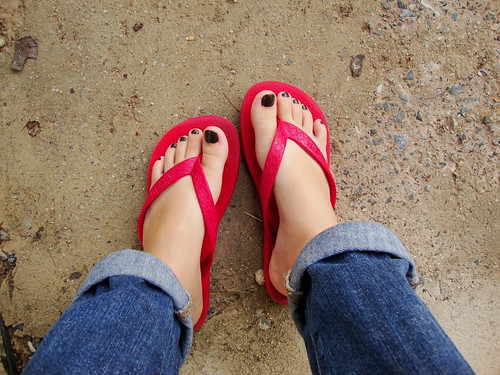In keeping with the topic of theories about chronic pain, I would like to present “The Flip Flop Theory,” written by Cassandra Russom. This theory is geared a little more toward how to HANDLE pain ourselves, as opposed to explain it to others, but the more we educate ourselves and the better we understand hot to handle our own pain, the better we are at getting others to understand how it feels to walk in our…flip flops.
- THE FLIP FLOP THEORY
By: Cassandra Russom at http://fighterzblog.wordpress.com/2013/05/16/the-flip-flop-theory/
If you have a chronic illness or deal with chronic pain, chances are you’ve heard of “The Spoon Theory“, written by Christine Miserandino. If you haven’t, the basic gist of The Spoon Theory is that those with chronic illnesses (in her case, lupus) have a certain amount of “spoons” that they must keep constant track of while going through a normal day. Spoons represent energy, of a sort; your ability to perform tasks and get through the day. When you’re out of spoons, you’re out of luck. A “normal” person has a seemingly unlimited supply of spoons, and they can simply do whatever they want without having to weigh the consequences of energy levels or take pain into consideration. A “Spoonie” does not. They must weigh every decision, no matter how small, against the choices they must make later in the day and the circumstances they find themselves in that day (high pain levels? fever? nausea? rashes? foggy? dizzy?) to make sure they have enough resources to go around… hopefully. The Spoon Theory was born as a way to explain to someone without a chronic illness what it is like to deal with the ever-present symptoms and pain on a daily basis.
“I explained that the difference in being sick and being healthy is having to make choices or to consciously think about things when the rest of the world doesn’t have to. The healthy have the luxury of a life without choices, a gift most people take for granted.”
One of the ideas within The Spoon Theory that resonates with those in the chronic illness community is that of having something taken away from them. In the spoon example Christine employed with her friend, she took away the spoons as her friend moved through her hypothetical day to convey the idea of loss.
“Most people start the day with unlimited amount of possibilities, and energy to do whatever they desire, especially young people. For the most part, they do not need to worry about the effects of their actions. So for my explanation, I used spoons to convey this point. I wanted something for her to actually hold, for me to then take away, since most people who get sick feel a ‘loss’ of a life they once knew. If I was in control of taking away the spoons, then she would know what it feels like to have someone or something else, in this case Lupus, being in control.”
When you’re coping with chronic illnesses, you get the idea of loss. It is not a foreign concept at all. We have all lost something to our diseases, whether it be friends, family, gainful employment, hobbies, passions, relationships, or independence. We know how to grieve, and we face the reality of our losses daily. This is one reason why The Spoon Theory resonates very deeply with me, and why I use it to give “normals” a glimpse into what my life is like now. However, as important as it is to acknowledge the losses we’ve suffered and to grieve them in a healthy way, is it not equally important to acknowledge, realize, and remember the beautiful and joyful things that come along with our new lives? I love how Christine wraps up The Spoon Theory with this gentle reminder to her friend:
“I gave her a hug when we walked out of the diner. I had the one spoon in my hand and I said ‘Don’t worry. I see this as a blessing. I have been forced to think about everything I do. Do you know how many spoons people waste everyday? I don’t have room for wasted time, or wasted ‘spoons’ and I chose to spend this time with you.’”
One of the things that I love and would never have gotten to experience without these diseases of mine are the chronic illness support groups that I’ve found online and on social networking sites. These communities are full of incredible people who never fail to support, encourage, and inform one another. We’re all going through a tough time, but that doesn’t stop anyone from sharing the love and insight that they carry, because every single one of us can empathize with the struggles of the others in the group. What’s more, successes are met with genuine celebration and joy– there is no envy, bitterness, or strife. (And if there is, the mods are all over that!) They are refuges that I have found for healing, even while my body struggles with the concept of healing.
In regards to healing, there’s one very important lesson that I’ve learned in the past year, and it is this: be kind to yourself. The idea was first introduced to me by a therapist I was seeing, and it was a completely foreign concept. She encouraged me to frequently do things for myself that made me happy, for the sole purpose of, well, making myself happy. It took some experimenting and some very intentional work, but I began actively being kind to myself. It encompassed more than just random activities that made me happy, but also included the frame of mind in which I thought about myself. I learned to be gentle with my expectations and less frequent in my criticisms. I was in therapy with this particular counselor at the beginning of my sudden and rapid slide into more severe illness, and though our sessions ended before I hit bottom I found that the lessons I learned in being kind applied to my new life as a Spoonie, not just as an abuse survivor. Recently, my massage therapist brought up the same concept at the end of one of our sessions, after I mentioned my most recent bout with depression. She “prescribed” doing one thing every day that makes me happy. As I reflected on this, I realized that I had fallen out of the habit of being intentionally kind to myself, and I needed to revive the practice. This, of course, got me to thinking about the practice and importance of being kind to ourselves, especially in a world that is often unkind and not understanding of those with invisible illnesses.
In one of the private groups I frequent, a friend made this comment regarding The Spoon Theory and a fibromyalgia re-write entitled The Straw Theory:
“I appreciate what both of these theories are trying to tell us. I would love to see something written as a reward type of theory. I am just rambling on here, but both of these things take something away. Haven’t we already had enough of that? The flower on this post made me think of giving ourselves some sort of gift for every goal we meet, such as getting out of bed! Any ideas?”
Another friend agreed wholeheartedly with the idea, and begged for flip-flops to be used as the reward. So, with that challenge in hand… here I am.
Think about flip flops. What do they represent? For most people, flip flops conjure up images of summer, the beach, relaxation, or casual get-togethers with friends or family. Flip flops mean no pressure, no stress, and lowered expectations. To me, flip flops represent the essence of being kind to oneself. It is a break from the normal grind of reality, lowering the expectations and going with the flow. Let’s be honest– living with a chronic illness is hard. It’s hard emotionally, it’s hard mentally, it can be very hard spiritually (whatever “spiritual” means to you), and it’s obviously incredibly hard physically. I think it’s time that, instead of being so hard on ourselves and holding ourselves to unrealistic, unhealthy expectations, we need to “put on our flip flops” and be kind to ourselves. I don’t know about you, but I have these ideas in my head of “what I should be able to do”. When I don’t or can’t accomplish those things and meet those self-set expectations (or maybe you have someone in your life setting unhealthy, unrealistic expectations for you), then the criticisms come. The disappointment. The blaming, the self-loathing, the anger, the frustration… the tears. The “I wish my life were different why meeeeeeeeeeee?!”
When you find yourself spiraling downward in the trap of unrealistic expectations, stop. Just stop. Put on a pair of flip flops. Think of ways to be intentionally kind to yourself. Think of what you have accomplished, and reward yourself for it! I saw another chronic illness blogger recording her daily accomplishments, and it inspired me to chronicle my own accomplishments as a way to combat the “I don’t do anything” disappointment that I pile upon myself on a regular basis. I began listing my accomplishments every day. “Did homework. Went to store. Took a 10 minute walk. Made banana bread.” Anything that required effort on my part, anything that I could consider an accomplishment, it went on the list. One day, “took a nap” was on my list of accomplishments. Some days, “showered” is on the list. Some days, “showered” is pretty much the onlything on the list! But looking at the cold, hard proof of what I have actually done encourages me to realize that my perception of reality is not necessarily accurate all the time, and it encourages me to “put on a pair of flip flops” and be kind to myself. I deserve it. My life is tough. Your life is tough. When will you catch a break unless you give yourself one?
So we have The Spoon Theory, which explains what life with a chronic illness is like. Now we have The Flip Flop Theory, which is a reminder to calm down, step back, and be kind to yourself. On purpose. On a regular basis. Because our lives are hard enough, and we deserve it.
Photo courtesy of Cíntia Regina via Compfight



Wow, thank you for including this! I’m flattered that someone has found it of worth. I wrote that what feels like forever ago, so it was like reading something written by someone else entirely! Always a weird feeling, but also a good reminder. It’s nice to realize that I don’t have to struggle as hard with and have to actively remember to be kind to myself…most days. Again, thank you for using my article, and I look forward to reading through your archives.